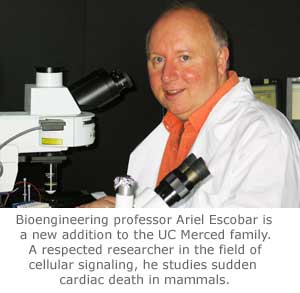

Professor
Ariel Escobarcame to the world of academia a little late in life. After building a career in Argentina as an
electrical engineer, he decided he wanted to be a scientist.
“Ever since I was a little boy, I was interested in the body’s electricity,” said Escobar, who recently joined UC Merced’s
School of Engineering. “I still work with electrical impulses, just in a different way.”
Getting the training necessary to study the electrical behavior of cells wasn’t an easy task for Escobar, because it’s not common to pursue
graduate studiesin subjects other than what you studied as an undergrad outside of the U.S.
However, his willingness to move all over the globe - Chile, Venezuela, Brazil, Texas, Uruguay, Los Angeles - helped him to earn the education and research opportunities necessary for a
bioengineeringcareer.
In the spring, he moved his entire lab from Texas to UC Merced. Here, he’s studying sudden cardiac death in mammals. More specifically, he’s examining how calcium affects the electrical surges in cells that lead to cardiac arrest.
Considered the “father” of technology that allows scientists to examine fragile heart cells without removing them from the heart, Escobar said it’s UC Merced’s cutting-edge programs and philosophies that drew him here.
“Having spent my whole academic career working in medical schools, it’s very exciting to finally have an engineering post,” Escobar said, though the proposed
medical schoolalso gets his blood pumping. “Possibilities always excite me. We have great junior faculty here, great students here and great opportunities to do great science.”
It’s that level of enthusiasm that attracted
Dean Jeff Wrightto bring Escobar aboard.
“He is an excellent researcher who will build the reputation of our university in the arena of bioengineering,” Wright said. “And I believe his experience and expertise will be valuable in recruiting additional faculty to the program and developing
researchcollaborations.”
Escobar, who says he’s grateful for the post here, feels the best way to help UC Merced and its surrounding community is by training great scientists.
“People think scientists are brilliant, but really, we are just curious people who want to know “why” and aren’t afraid to ask and argue to find that out,” he said.
Escobar says what makes him so good at what he does is that he never tires of asking “why?” In fact, his favorite place on campus is his lab, and that’s the best place to find him.
“The best thing I do for my students is that I get into the lab every day and conduct my own experiments,” he said. “I was very lucky to learn from the best, and even my most famous teachers were scientists who did their own experiments and still do.”






